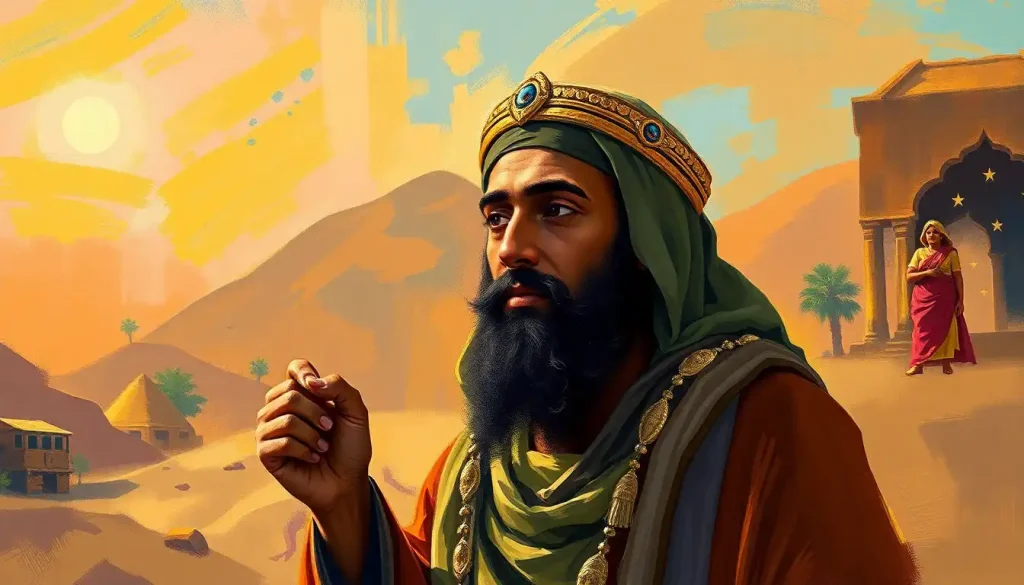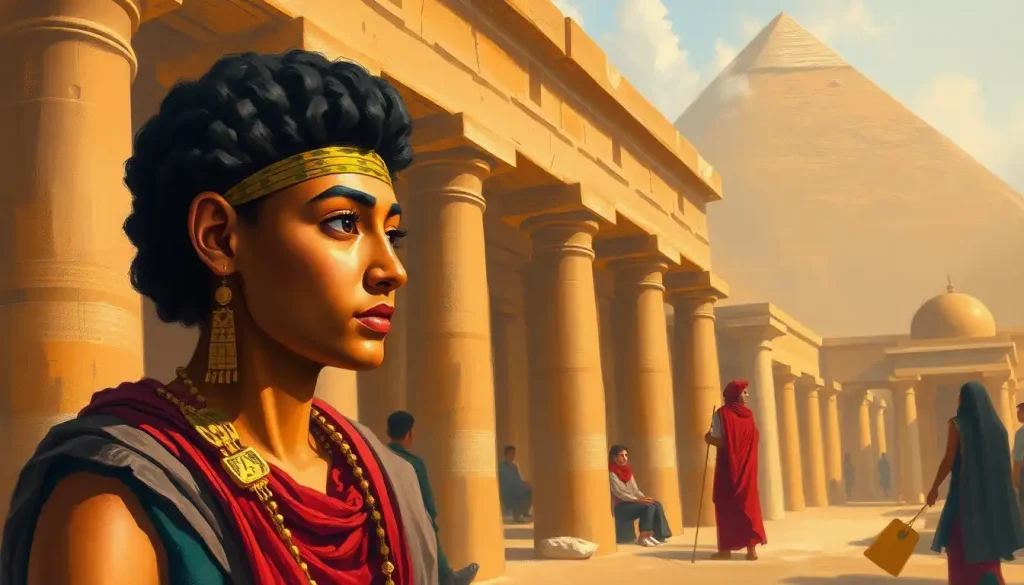Through the ages, the world’s most successful individuals have shared a surprising secret: their fortunes stemmed not from their bank accounts, but from an ancient treasure far more valuable than gold. This treasure, hidden in plain sight, has been the cornerstone of prosperity for millennia. It’s not a tangible asset you can hold in your hands or store in a vault. Instead, it’s an intangible quality that has shaped civilizations, guided leaders, and transformed lives: wisdom.
The concept of wisdom as wealth isn’t new. In fact, it’s as old as human civilization itself. But in our modern world, where material possessions often take center stage, we sometimes forget the true value of this timeless asset. So, let’s embark on a journey to explore the intricate connection between wisdom and wealth, and discover why the wisest among us have always known that true riches lie not in their coffers, but in their minds.
Unraveling the Threads of Wisdom and Wealth
Before we dive deeper, let’s take a moment to define our terms. Wisdom, in its essence, is the ability to think and act using knowledge, experience, understanding, common sense, and insight. It’s not just about knowing facts; it’s about applying that knowledge in meaningful ways. Wealth, on the other hand, is often associated with an abundance of valuable possessions or money. But is that all there is to it?
The age-old debate of whether wisdom is wealth has puzzled philosophers, economists, and everyday folks alike. Some argue that financial wealth is the ultimate goal, while others contend that wisdom is the true measure of a person’s riches. But what if it’s not an either-or proposition? What if wisdom and wealth are two sides of the same coin, each enhancing and amplifying the other?
As we journey through this article, we’ll explore the concept of wisdom as wealth, examine how wisdom interplays with financial success, and discover strategies for cultivating wisdom for long-term prosperity. We’ll also delve into the impact of wisdom on different types of wealth and address the challenges of prioritizing wisdom in our wealth-driven world.
The Golden Thread: Wisdom as the Ultimate Wealth
The phrase “wisdom is wealth” isn’t just a catchy saying; it’s a profound truth that has echoed through the corridors of time. From ancient philosophers to modern-day thought leaders, the idea that wisdom is the ultimate form of wealth has persisted across cultures and epochs.
Take, for instance, the biblical figure of King Solomon. King Solomon’s wealth is legendary, but what’s often overlooked is that he valued wisdom above all else. When given the opportunity to ask for anything from God, Solomon chose wisdom over riches or power. This choice not only made him the wisest ruler but also brought him unparalleled prosperity.
Throughout history, societies have recognized the value of wisdom. In ancient Greece, philosophers were revered for their wisdom and considered among the wealthiest members of society, not for their material possessions, but for their intellectual riches. In Eastern traditions, sages and spiritual leaders were often seen as the truly wealthy, their wisdom considered more valuable than any earthly treasure.
But how does wisdom contribute to personal and societal growth? For one, wisdom allows us to make better decisions, both in our personal lives and in the broader context of society. It helps us navigate complex situations, solve problems more effectively, and create innovative solutions to challenges. Wisdom also fosters empathy and understanding, leading to stronger relationships and more cohesive communities.
Moreover, wisdom acts as a multiplier for other forms of wealth. It enhances our ability to acquire and use knowledge, make sound financial decisions, and cultivate meaningful relationships. In essence, wisdom is the fertile soil from which all other forms of wealth grow.
The Dance of Dollars and Sense: Wisdom’s Role in Financial Success
While wisdom is valuable in its own right, it’s impossible to ignore its impact on financial wealth. The interplay between wisdom and financial success is a fascinating dance, with each partner supporting and enhancing the other.
Wisdom plays a crucial role in making better financial decisions. It helps us see beyond short-term gains and consider long-term consequences. For example, a wise investor doesn’t just chase the latest hot stock tip but considers market trends, diversification, and their own financial goals. This approach, rooted in wisdom, often leads to more stable and sustainable financial growth.
Consider the case of Warren Buffett, often called the “Oracle of Omaha.” His financial success isn’t just due to his business acumen, but also to his wisdom in understanding human nature, market psychology, and the value of patience. Buffett’s famous quote, “Be fearful when others are greedy and greedy when others are fearful,” is a perfect example of how wisdom can lead to financial success.
Another example is Ray Dalio, founder of Bridgewater Associates. Dalio attributes much of his success to his pursuit of wisdom through what he calls “radical transparency” and “idea meritocracy.” These principles, born from his accumulated wisdom, have not only made him one of the most successful hedge fund managers but have also contributed to his personal growth and the success of his organization.
But wisdom doesn’t just help in acquiring wealth; it’s equally crucial in maintaining and growing it. Many lottery winners, for instance, end up bankrupt within a few years of their windfall. Why? Often, it’s because they lack the wisdom to manage their newfound wealth effectively. On the other hand, individuals who combine financial success with wisdom tend to not only preserve their wealth but also use it in ways that benefit themselves and others.
Nurturing the Seeds of Wisdom: Cultivating Long-term Prosperity
If wisdom is so valuable, how can we cultivate it? Unlike financial wealth, wisdom can’t be inherited or acquired overnight. It’s a lifelong journey of learning, reflection, and growth. But there are strategies we can employ to nurture the seeds of wisdom and reap the benefits of long-term prosperity.
One of the most effective ways to develop wisdom is through experience and reflection. As the saying goes, “Experience is the best teacher.” But it’s not just about having experiences; it’s about reflecting on them, learning from them, and applying those lessons to future situations. This process of experiential learning is at the heart of wisdom cultivation.
Another crucial aspect of developing wisdom is lifelong learning. In our rapidly changing world, the willingness to continually learn and adapt is more important than ever. This doesn’t necessarily mean formal education (although that can certainly contribute). It could be reading widely, engaging in meaningful conversations, or pursuing new skills and hobbies. The Way to Wealth summary, based on Benjamin Franklin’s timeless financial wisdom, emphasizes the importance of continuous learning and self-improvement.
Mindfulness and self-reflection are also powerful tools for cultivating wisdom. Taking time to pause, reflect on our thoughts and actions, and consider their consequences can lead to profound insights and wiser decision-making.
However, it’s important to note that the pursuit of wisdom shouldn’t come at the expense of meeting our basic needs. Balancing the pursuit of wisdom with practical considerations is itself an act of wisdom. After all, it’s challenging to ponder life’s great questions when you’re worried about putting food on the table.
Beyond the Bank Account: The Many Faces of Wealth
When we talk about wealth, our minds often jump straight to financial assets. But true wealth encompasses much more than just money. Wisdom plays a crucial role in cultivating different types of wealth, each contributing to a rich and fulfilling life.
Intellectual wealth, for instance, is directly tied to wisdom. It’s not just about accumulating knowledge, but about understanding how to apply that knowledge effectively. This type of wealth allows us to engage more deeply with the world around us, solve complex problems, and continually grow as individuals. The benefits of intellectual wealth extend far beyond personal satisfaction; they can lead to career advancement, innovative breakthroughs, and meaningful contributions to society.
Social wealth is another area where wisdom shines. Wise individuals tend to build stronger, more meaningful relationships. They understand the value of empathy, active listening, and mutual respect. These qualities not only enrich our personal lives but can also lead to professional opportunities and a strong support network. As the saying goes, “Your network is your net worth,” and wisdom is the tool that helps us build and nurture that network effectively.
Emotional wealth, often overlooked in discussions of prosperity, is perhaps one of the most important types of wealth we can cultivate. Wisdom helps us understand and manage our emotions, leading to greater resilience, better mental health, and more satisfying relationships. Emotionally wealthy individuals are better equipped to handle life’s ups and downs, make decisions under pressure, and maintain a sense of inner peace even in turbulent times.
Swimming Against the Current: Wisdom in a Wealth-Obsessed World
In our modern society, where material success is often glorified and instant gratification is the norm, prioritizing wisdom can feel like swimming against the current. The challenges are real, but so are the rewards.
One of the biggest hurdles is overcoming societal pressures to focus solely on financial wealth. We’re bombarded with messages about the latest must-have products, the importance of keeping up with the Joneses, and the idea that our worth is tied to our bank balance. Breaking free from these societal expectations requires wisdom and courage.
Finding balance between pursuing wisdom and meeting financial needs is another significant challenge. It’s easy to fall into the trap of thinking we’ll focus on wisdom once we’ve “made it” financially. But this approach often backfires, as the pursuit of financial wealth without wisdom can lead to poor decisions and missed opportunities for growth.
The role of education systems in promoting wisdom alongside wealth is crucial in addressing these challenges. While traditional education often focuses on imparting knowledge and skills for career success, there’s a growing recognition of the need to teach wisdom – critical thinking, ethical reasoning, and emotional intelligence. Olistico Wealth approaches financial well-being from a holistic perspective, emphasizing the importance of wisdom in achieving true prosperity.
The Timeless Treasure: Wisdom’s Enduring Value
As we’ve journeyed through the intricate relationship between wisdom and wealth, one thing becomes clear: wisdom is not just a path to wealth, but a form of wealth itself. It’s a treasure that appreciates over time, unlike material possessions that depreciate or financial assets that fluctuate with market whims.
The enduring value of wisdom in an ever-changing world cannot be overstated. In a time when technological advancements are rapidly changing the landscape of work and society, wisdom provides a stable foundation. It gives us the tools to adapt, to see opportunities where others see challenges, and to navigate uncertainty with confidence.
Moreover, wisdom enriches our lives in ways that financial wealth alone cannot. It deepens our understanding of ourselves and others, enhances our ability to find meaning and purpose, and allows us to contribute positively to the world around us. As the saying goes, “A godly heritage is better than great wealth”, reminding us that the wisdom we pass on to future generations is far more valuable than any material inheritance.
But perhaps the most compelling argument for the value of wisdom comes from those who have achieved both wisdom and financial wealth. Many of the world’s most successful individuals, from business leaders to philanthropists, emphasize that their greatest asset is not their financial portfolio, but the wisdom they’ve accumulated over the years.
Take, for example, the story of Solomon’s wealth. While his riches were legendary, it was his wisdom that truly set him apart and ensured his place in history. This ancient tale serves as a powerful reminder that true wealth lies not in our possessions, but in our capacity for wisdom.
In conclusion, as we navigate our own paths to prosperity, let’s remember that the pursuit of wisdom and the pursuit of wealth need not be mutually exclusive. In fact, they can and should go hand in hand. By investing in both wisdom and wealth, we set ourselves up for a life that is not just financially secure, but rich in all the ways that truly matter.
So, let’s challenge ourselves to look beyond the balance sheets and bank statements. Let’s recognize that our most valuable asset is not something we can hold in our hands, but something we hold in our minds and hearts. Let’s embrace wisdom as the true measure of our wealth, and in doing so, unlock a prosperity that goes far beyond dollars and cents.
After all, in the grand ledger of life, it’s not the numbers in our account that define us, but the wisdom we’ve gained, the lives we’ve touched, and the legacy we leave behind. That, dear reader, is the true wealth that stands the test of time.
References:
1. Sternberg, R. J. (2003). Wisdom, Intelligence, and Creativity Synthesized. Cambridge University Press.
2. Schwartz, B., & Sharpe, K. E. (2010). Practical Wisdom: The Right Way to Do the Right Thing. Riverhead Books.
3. Dalio, R. (2017). Principles: Life and Work. Simon & Schuster.
4. Kasser, T. (2002). The High Price of Materialism. MIT Press.
5. Csikszentmihalyi, M. (1990). Flow: The Psychology of Optimal Experience. Harper & Row.
6. Goleman, D. (2006). Emotional Intelligence: Why It Can Matter More Than IQ. Bantam Books.
7. Frankl, V. E. (1984). Man’s Search for Meaning. Washington Square Press.
8. Peterson, J. B. (2018). 12 Rules for Life: An Antidote to Chaos. Random House Canada.
9. Taleb, N. N. (2012). Antifragile: Things That Gain from Disorder. Random House.
10. Kahneman, D. (2011). Thinking, Fast and Slow. Farrar, Straus and Giroux.












Would you like to add any comments? (optional)